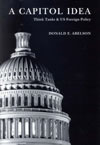Introducing Donald Abelson
 Donald Edward Abelson is Professor of the Department of Political Science at the University of Western Ontario. Moreover, he is Director of the Canada-US Institute and of the Centre for American Studies. Professor Abelson received his BA in Political Science from the University of Toronto. Subsequently, he obtained an MA and Ph.D in Political Studies from Queen’s University (Kingston, Ontario) and an MA in Journalism from The University of Western Ontario.
Donald Edward Abelson is Professor of the Department of Political Science at the University of Western Ontario. Moreover, he is Director of the Canada-US Institute and of the Centre for American Studies. Professor Abelson received his BA in Political Science from the University of Toronto. Subsequently, he obtained an MA and Ph.D in Political Studies from Queen’s University (Kingston, Ontario) and an MA in Journalism from The University of Western Ontario.
His teaching focuses on the fields of American Politics and American Foreign Policy.
In this interview, Professor Abelson elaborates on his book “A Capitol Idea: Think Tanks and US Foreign Policy”. What does he hope to achieve with the book? Why is it so difficult to define the concept ‘think tank’ and measure the direct influence of such an institution? And what explains their relatively strong position in the US?
Interview
The Book
 What distinguishes the book from other literature in the field?
What distinguishes the book from other literature in the field?
“A Capitol Idea” is among the few books on think tanks and US foreign policy that requires readers to think more critically about how these institutions achieve influence in key policy-making circles. Although the literature on think tanks has improved significantly in recent years, little progress has been made in developing appropriate models and/or theories to assess how much of an impact these organizations have had in shaping public opinion and public policy.
This book argues that scholars need to provide a more nuanced understanding of policy influence and how non-governmental organizations, including think tanks, can achieve it. Relying on two contemporary and controversial American foreign and defense policy issues – the development of a national missile defense and the ongoing war on terror, “A Capitol Idea” chronicles how and to what extent a select group of think tanks have been able to shape the parameters of important public and private policy debates.
This book builds on two previous books I have written on think tanks – “American Think Tanks and their role in US Foreign Policy” (Palgrave Macmillan, 1996) and “Do Think Tanks Matter? Assessing the Impact of Public Policy Institutes” (McGill-Queen’s University Press, 2002 revised Second Edition, 2009) in highlighting the importance of understanding how this diverse group of organizations navigate their way through an increasingly crowded marketplace of ideas.
What do you hope to achieve with the book?
I hope that this book achieves two things. First, that it encourages more scholars to study how non-governmental organizations rely on various public and private channels to convey their ideas to policy-makers, journalists and members of the attentive public. And second, that after reading this book, people who study politics will be more aware of the many methodological barriers we have to overcome to assess how much or little influence think tanks and other non-governmental organizations have in shaping public opinion and public policy.
Often, scholars, journalists and directors of think tanks rely on anecdotal information to convince others about how much influence these types of organizations wield. My hope is that before making unsubstantiated assertions about the nature of think tank influence, we step back and understand why it is so difficult to measure influence and why we need to develop more useful approaches to assessing how and under what circumstances ideas can shape the way governments think.
Theorizing about think tanks
What is a ‘think tank’ and why is it difficult to exactly define this term?
There is no consensus among scholars as to how to define a think tank, in large part because the so-called think tank community in the United States and around the globe is so diverse. The term think tank was coined in the United States during WWII to refer to a secure room or environment where military planner could meet to discuss wartime strategy. However, in recent years, it has generally been employed to describe non-profit, non-partisan (not to be confused with non-ideological), independent (in terms of governance) organizations engaged in the study of domestic and/or foreign policy issues. Think tanks vary enormously in size, financial resources, areas of specialization, etc, but what they share in common is a profound desire to influence public opinion and public policy. This is their raison d’etre.
What are the main theories about the significance of think tanks?
Scholars have employed different theories to explain the evolution and role of think tanks in the policy-making process. Some rely on pluralist and elite theories to account for how think tanks have become so entrenched in the political arena, while others focus more on institutional approaches to explain the impact of think tanks. My work falls into the latter category since I track the various stages in the policy-making process where think tanks make their presence felt. There are advantages and pitfalls to relying on any of these approaches, so we often need to draw on more than one approach to provide a more complete picture of how think tanks operate.
What do you mean by “the marketplace of ideas” and what is the role of think tanks in this respect?
Think tanks, not unlike corporations in the private sector, must compete in a marketplace where ideas, like commodities and other consumer products are aggressively marketed. Think tanks may not be concerned about quarterly gains and losses as corporations are, but they must nonetheless compete among themselves and other idea peddlers to attract the attention of key stakeholders. The marketplace of ideas simply refers to the arena in which think tanks try to achieve notoriety and influence. They market their publications and promote their research findings in the hope that their ideas will have an impact – subtle or profound in shaping the decisions of leaders in industry, the media, and in government. Think tanks are by no means the only players in the marketplace of ideas, but in the past four decades, they have clearly staked out an important position.
Why is it difficult to measure the direct impact of think tanks?
This is a question that continues to keep me up late at night. Measuring the direct influence of think tanks is notoriously difficult in large part because it is often impossible to determine the extent to which a scholar working at a think tank or a particular institution was responsible for convincing the President or key members of Congress to adopt a particular policy position. There are so many individuals and organizations injecting ideas into the policy-making process that to isolate one voice that carried the day is virtually impossible. As Martin Anderson of the Hoover Institution remarked, “every successful policy idea has a hundred mothers and fathers. Every bad policy idea is an orphan.”
Policy makers are inundated with information from multiple sources, but at the end of the day, they have to make a decision. That decision may be influenced by the wishes of their constituents, the demands of special interest groups, pressures from party members or by countless other factors. This is one of the many reasons why determining the direct influence of think tanks on policy-making is inherently problematic. And this is why scholars need to rely on both quantitative and qualitative approaches to explain how relevant think tanks are in key policy debates.
Think tanks in the US
Why are there relatively many think tanks in the US?
There are over 6,000 think tanks worldwide and close to half of them are located in the United States. More than any other country, the US provides fertile soil for think tanks to grow. When you combine a highly fragmented and decentralized political system that creates multiple channels of access to policy-makers, a weak party system where 535 members of Congress are free to vote as they see fit, a strong and vibrant philanthropic culture and an active class of policy entrepreneurs willing to promote a set of policy beliefs, it is not surprising that think tanks have become so dominant in the United States. Add to this a powerful news media with a voracious appetite for controversial ideas and a tax regime that rewards giving and you have the ideal environment for think tanks to flourish. There is no other country in the world that has created more hospitable conditions for think tank growth than in the United States.
How has the position of think tanks in US foreign-policy making evolved over time?
There is no doubt that the foreign policy-making process in the United States has become more accessible to think tanks since the end of the Vietnam War. This doesn’t mean that all presidential administrations have welcomed the advice of think tanks. Both think tanks on the right and left of the political spectrum were frustrated with the limited access they had to the White House during the administration of George W. Bush. Indeed, it wasn’t until very late into his second term in office that policy experts from think tanks were provided with a formal channel to Bush.
But, it is also important to keep in mind that policy experts from think tanks frequently testify before congressional committees focusing on foreign and defense policy issues, publish regularly in journals, books, and newspapers and sit on various government advisory boards. And as my book illustrated with respect to some very important foreign and defense policy matters, some think tanks have been present at the creation. Some have played a critical role in advancing important issues through the foreign policy-making process. Others, have kept debates over issues such as national missile defense alive and well.
Which think tanks do you consider the most influential ones in the US?
This is a difficult question to answer because of what I have already said about the barriers we need to overcome to measure think tank influence. There are clearly several highly visible and prominent think tanks in the US, including the Brookings Institution, the Heritage Foundation, the American Enterprise Institute, the Rand Corporation, etc, but there will always be disagreement among scholars as to which ones have the most influence in shaping the way the public and policy-makers think.
What role did think tanks play in the War on Terror?
According to some journalists and scholars, think tanks, including the now-defunct Project for the New American Century (PNAC) played a critically important role in helping President Bush execute the War on Terror. While there is no doubt that PNAC helped lay the foundation for a critical discussion about the war, there were other think tanks – most notably, the American Enterprise Institute – that may have played an even more important role. Several think tanks helped shape the parameters of key debates surrounding the War on Terror, but in the end, it was President Bush’s decision to move in this direction. Think tanks need to bear some responsibility for offering poor and misguided advice to key decision-makers, but the president above everyone else must live with America’s decision to go to war. It will take some time before the full story about think tank involvement in the War on Terror is known. But I am confident that when it is known, we will begin to appreciate how important these institutions have become in American and global politics.
